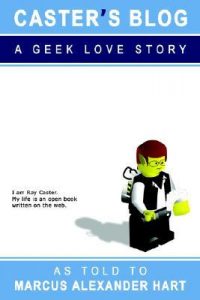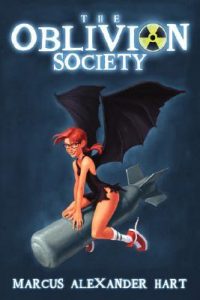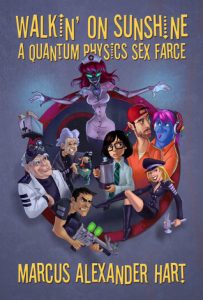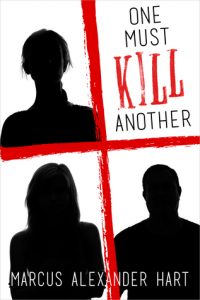
After reading my Goodreads giveaway win One Must Kill Another, I had a story hangover that prompted me to ask the author for an interview. This was a good move, as you’ll see below. He’s freaking hilarious! I’m gonna be his #2 fan (apparently, #1 is already taken; plus, my author heart belongs to Diane Chamberlain). Read on, my friends, and then click the links to read Hart’s books.
Tell me about your writing process—schedule, environment, strategies, and inspirations inside and outside your head: favorite writers, quotes, stars, moons, etc.
I am a total writing hermit. I don’t understand how some people can set up shop and write all day in a crowded Starbucks. I’m way too easily distracted for that. I can’t even listen to music. In fact, I got a pair of those hearing-protection earmuffs that leaf-blower guys wear that I use while I’m writing. It may be a little excessive, but it helps me focus.
 There’s a meme by @adamjk with an inspirational quote that’s partially crossed out and amended that says, “Do what you love and you’ll never work a day in your life work super fucking hard all the time with no separation or any boundaries and also take everything extremely personally.” That is so true. There’s a culture around writing that says writing isn’t something you do, it’s something you are, and I think that’s dangerous. We get so caught up in “writer” as an identity that we sometimes forget there are other things in life and burn out, feeling like if we’re not always writing, we’re slacking off or cheating somehow. So when I’m lucky enough to be writing full-time, I try to keep normal business hours. Like, writing from 8 AM to 6 PM with an hour for lunch. Then I “go home,” even though I work at home (with the shades drawn and my earmuffs on).
There’s a meme by @adamjk with an inspirational quote that’s partially crossed out and amended that says, “Do what you love and you’ll never work a day in your life work super fucking hard all the time with no separation or any boundaries and also take everything extremely personally.” That is so true. There’s a culture around writing that says writing isn’t something you do, it’s something you are, and I think that’s dangerous. We get so caught up in “writer” as an identity that we sometimes forget there are other things in life and burn out, feeling like if we’re not always writing, we’re slacking off or cheating somehow. So when I’m lucky enough to be writing full-time, I try to keep normal business hours. Like, writing from 8 AM to 6 PM with an hour for lunch. Then I “go home,” even though I work at home (with the shades drawn and my earmuffs on).
My favorite living writer is David Wong. I find his writing to be hilarious, but also moving on a personal, emotional level. His John Dies at the End stories are a perfect blend of flawed, relatable characters and dick jokes. I like to think that readers of his particular brand of nonsense will also enjoy mine.
As far as stars and moons, I approve of both. In fact, I approve of everything up to purple horseshoes. Any marshmallows added to Lucky Charms after 1983 are bullshit.
Walk me through your publishing process with a small press—who does what, how much input from you, and what marketing you do. Do you plan to self-publish in the future?
 To be honest, publishing with a very small press isn’t that much different from self-publishing. On the positive side, I get a lot of creative control I wouldn’t have at a large publisher, such as input on cover designs and final say on the edits to the text. On the negative side, most of the marketing and promotion responsibilities fall on me. And man, do I hate self-promoting. If I were gregarious and outgoing, I wouldn’t have chosen a job where I can work at home with the lights off!
To be honest, publishing with a very small press isn’t that much different from self-publishing. On the positive side, I get a lot of creative control I wouldn’t have at a large publisher, such as input on cover designs and final say on the edits to the text. On the negative side, most of the marketing and promotion responsibilities fall on me. And man, do I hate self-promoting. If I were gregarious and outgoing, I wouldn’t have chosen a job where I can work at home with the lights off!
I’ll definitely self-publish titles in the future. It’s great to have the freedom to write something too weird for traditional publishing and put it out there to see if it can find its audience. Because regardless of what publishers say, there’s an audience out there for everything. Internet Rule 34 is proof of that.
Describe your support system online and IRL—who are your biggest cheerleaders?
 My biggest, best, and most important cheerleader is, of course, my wife Amanda. I’d have given up a thousand times without her constant support and belief in me. She is also the reason no hilarious chapter about explosive diarrhea has ever made it to a final draft of one of my books, no matter how many times I try to sneak one in. So my career thanks her for that.
My biggest, best, and most important cheerleader is, of course, my wife Amanda. I’d have given up a thousand times without her constant support and belief in me. She is also the reason no hilarious chapter about explosive diarrhea has ever made it to a final draft of one of my books, no matter how many times I try to sneak one in. So my career thanks her for that.
There’s also my biggest fan, J.J. Walsh, who liked my first novel so much that he basically hunted me down and demanded we become friends. Ten years later we still are, and his support and kind words still mean the world to me. I often say that I just need to meet a hundred thousand more people like him and I’ll be set for life. I’m not even kidding. Where are you people? I know you’re out there.
How has your life prepared you to be a writer, how does your life influence your work and vice versa, and what brought you to the dark side?
Back in the early ’80s, the only “social media” that existed was my mom talking to her friends on the corded, rotary-dial phone in the dining room. As a child, I would listen to her chat with one friend, then hang up and call another to spread the gossip. With each call through the day, the story would slightly change, becoming ever more dramatic and juicy with each retelling. My mother inadvertently wired my young mind to understand that a good story is more important than a true story. Which is why I became a novelist and not a journalist.
 It would be hard to write anything without infusing it with my personal life experience. That’s the fuel that runs the brain machine. The fun part is doing what Mom taught me and changing it from a straight retelling of true events and into an engaging narrative. For example, in my latest book One Must Kill Another, the protagonists are a Hollywood family, and their experiences draw on my time working in the Los Angeles entertainment industry. But deeper than that, their fears and insecurities are also rooted in my own and modified to fit the characters and the story. I think if the underlying emotion is real, the details can be changed and it all still works.
It would be hard to write anything without infusing it with my personal life experience. That’s the fuel that runs the brain machine. The fun part is doing what Mom taught me and changing it from a straight retelling of true events and into an engaging narrative. For example, in my latest book One Must Kill Another, the protagonists are a Hollywood family, and their experiences draw on my time working in the Los Angeles entertainment industry. But deeper than that, their fears and insecurities are also rooted in my own and modified to fit the characters and the story. I think if the underlying emotion is real, the details can be changed and it all still works.
My next book is very different in content and tone, but it was based on the same experiences. Alexis vs the Afterlife is a Young Adult LGBT adventure-comedy about a burned-out, eighteen-year-old former child star who dies in a freak accident and becomes a rock-n-roll ghost who must save the world from a paranormal apocalypse. It’s completely batshit insane, but it still draws from my real-world experience in the entertainment industry and my lifelong fascination with the paranormal.
What do you love most about your creativity?
In a real world that too often seems completely out of control, it’s great to be able to create my own worlds that work the way I want them to—worlds where everyone has the snappy punch line at the right moment (and not five hours later when they’re in the shower), magic exists if you know how to use it, and the monsters always lose in the end.
Connect with Marcus and buy his books:
https://www.goodreads.com/OldPalMarcus